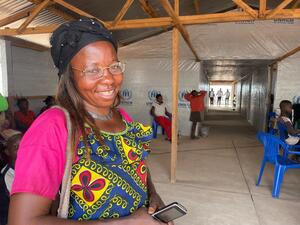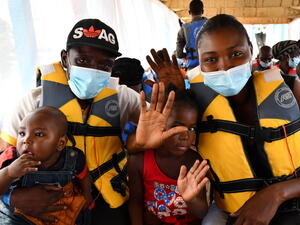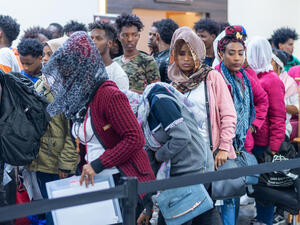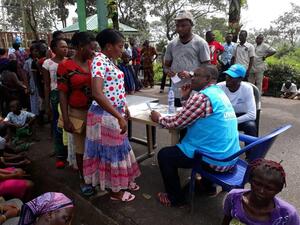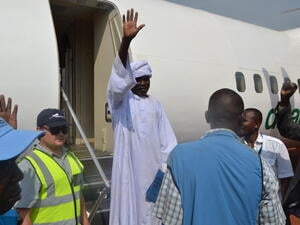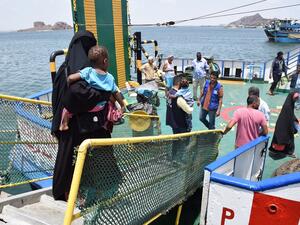Joyful cries greet first convoy home to South Sudan from Ethiopia
Joyful cries greet first convoy home to South Sudan from Ethiopia
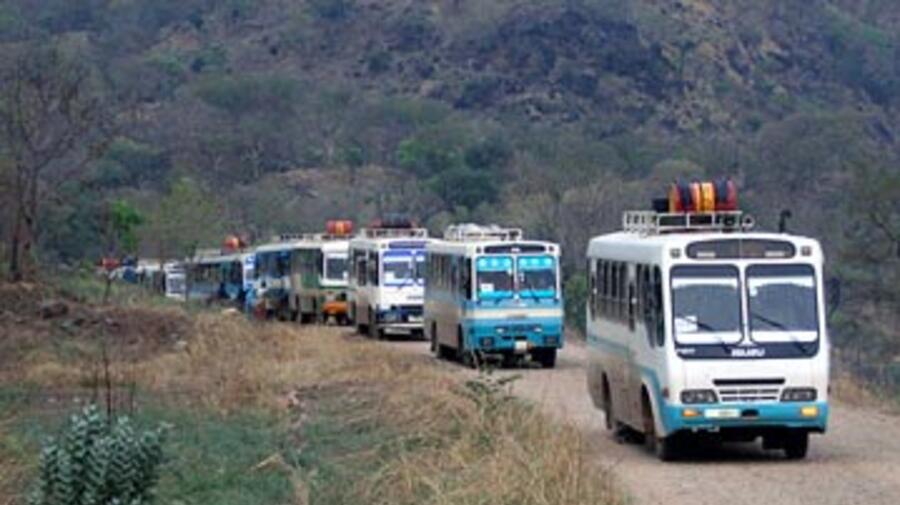
The first UNHCR-organised convoy carrying 500 refugees from Ethiopia to Sudan was mostly made up of children who, having grown up in camps, were returning to their homeland for the first time.
ON THE ETHIOPIA-SUDAN BORDER, Apr 4 (UNHCR) - To the sounds of crying, singing and ululation, Sudanese refugee John Yinka on Monday took his four children - all born in a refugee camp in neighbouring Ethiopia - home to his country for the very first time.
"The fact of bringing up kids who do not know their country has always troubled me," said Yinka, one of 500 Sudanese refugees on the first convoy organized by the UN refugee agency to take people to South Sudan from refugee camps in western Ethiopia.
Of 500 Sudanese on the first convoy, an astonishing 319 were under the age of 17, all born in exile. Return to South Sudan became possible after the January, 2005 signing of a peace accord that ended a 21-year north-south civil war. UNHCR has begun helping refugees go home from Kenya, the Democratic Republic of the Congo, Central African Republic and Ethiopia, although some returns have been put on hold because of insecurity in parts of South Sudan.
The 500 refugees set out from Bonga refugee camp in the Gambella region of Ethiopia on Friday, and spent three nights at way stations on the exhausting 820-km-long road before reaching the border town of Kurmuk on Monday morning, when the first 150 returnees crossed the border.
The remainder of the refugees are still crossing the border in smaller groups, staggered so as not to overwhelm the reception centre at Chali El Fiel in South Sudan.
On the convoy, refugees prayed and sang religious songs as they set out from Bonga, again as they reached the way stations on the route, and yet again before and after they crossed the border. "There is no place like home," was the familiar refrain from many of the returnees.
They got a rousing welcome just inside Sudan, where their compatriots turned out to receive them with the ceremonial slaughter of a white bull, prayers, songs and ululation.
"Today is a very emotional day and we are very happy to receive to New Sudan our fellow citizens who had been away for a very long time," said Ramada Yasin, advisor to the governor of the Blue Nile State, at the border crossing.
His government pledges to bring home all refugees, but he said that "because not even the basic services are in place, we cannot absorb more than 5,000 of them this year."
UNHCR, together with other UN agencies and partner non-governmental organizations, has been building infrastructure - schools, hospitals, health clinics, boreholes - to help South Sudan receive returnees.
"UNHCR and its partners will continue all they can to help make your country a place to return to," promised Ilunga Ngandu, UNHCR's Regional Liaison Representative in Addis Ababa, who came to Bonga to see off the returnees on Friday.
UNHCR supplied all returning refugees with blankets, sleeping mats, plastic sheets, guinea-worm filters, kitchen sets, soaps and sanitary supplies for women. Food rations, designed to last until the returnees' first harvest, were distributed at Chali, from where the refugees go to their own villages.
Some 14,000 Sudanese refugees in Ethiopia have told UNHCR they want to go home on organized convoys. The refugee agency expects to repatriate 4,500 refugees to Chali El Fiel and Nylie villages in the Blue Nile State of South Sudan before the rainy season starts at the end of May.
Meanwhile, John Yinka and his wife, James Thoga (who, despite the first name is indeed a woman), said they were ready to do all they can to build what is becoming known as New Sudan.
John said he will farm and James said she will make a living using the weaving skills she learned in Bonga Camp.
"I know life is going to be tough for some years to come," James said, gathering her four children about her, "but I also know very well that it was lack of peace, not poverty, that drove us from home in the first place."
By Kisut Gebre Egziabher
with the convoy

